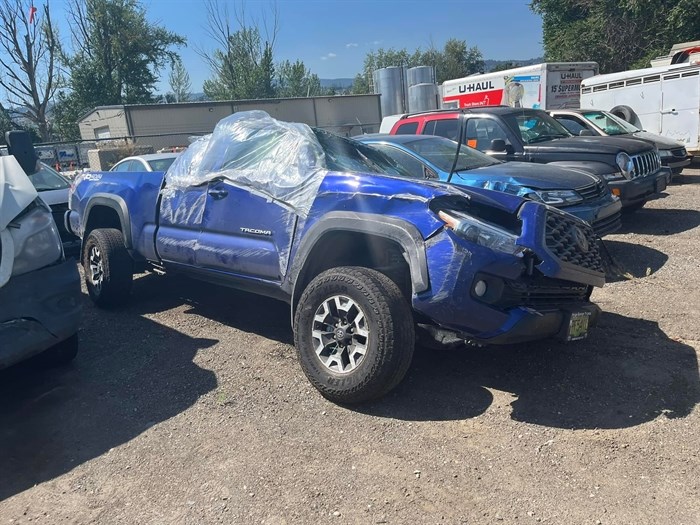Kamloops accident victim with brain injury battling ICBC no-fault insurance scheme

Every day is a struggle for former Kamloops resident Rise Gronlund, who was left with a brain injury after surviving a horrific car accident two years ago.
“Sometimes I have to take a few minutes, I forget some stuff, I zone out a little bit, it just comes and goes,” she said, taking time to get her words out and pausing often.
The 28-year-old is currently living in Chetwynd due to her boyfriend’s job. She is still too injured to work and is living with emotional trauma from the accident.
She said her biggest challenge is getting the financial support and therapy treatments she needs from ICBC.
Gronlund was in the passenger seat of her boyfriend’s truck on Highway 1 near Deadman Vedette Road near Kamloops on July 30, 2022 when an oncoming vehicle crossed the centre line and hit them head on.
She held back tears as she recounted her memories of the horrific incident.
“I lost consciousness for a couple of seconds, I don’t know, time kind of gets messed up, but I remember looking up and seeing the car coming and flipping, I thought we're going down a cliff because we rolling,” she said. “Things were going so fast, I just remember waiting to die, we kept spinning.”
While rolling, Gronlund was hit in the head by a metal tow bar. The vehicle came to a stop and she was surrounded by deployed air bags.
“We couldn’t see anything, the airbags covered all the windows, the cab was crushed,” she said.
Gronlund was transported to the trauma section of Royal Inland Hospital in a neck brace.
“The hospital was so overwhelmed with patients, they just wanted to know if I’m dying right now and if not, I could go home,” she said. “I didn’t get good assessments done and because of that I’ve had to advocate for myself to get what I need.
“I didn’t get any X-rays done, I had glass in my legs so I had to deal with that. I was so dizzy, my brain wasn’t working and I didn’t know what was happening to me.”
READ MORE: Kamloops mayor to represent himself in one of two defamation cases
Gronlund has been living with life altering cognitive problems since.
Her boyfriend was able to return to work.
The other driver survived, but Gronlund doesn’t have any other information about her.
Gronlund has been battling adjusters through ICBC’s no-fault insurance to get her income replacement benefits and occupational therapy treatments covered.
In 2021, the NDP government changed the Insurance Vehicle Act to no-fault accident coverage that was lauded for saving drivers up to $400 per month, but leaves accident survivors under the thumb of the provincial insurer, said Michael Elliott, president of the Trial Lawyers Association of BC, in a previous interview with iNFOnews.ca.
Accident victims can no longer sue ICBC, which now caps lost income and pays for Enhanced Care, like occupational therapy and physiotherapy.
“That’s the worst part, hands down and I realized nobody knows about the no-fault rule, day-to-day people have no idea if they get in a car accident there’s no suing for damages, and you can’t sue ICBC at all,” Gronlund said.
READ MORE: Prosecutors double-down, no criminal charges in fatal Kamloops crash
Care needs are determined by ICBC adjusters, not doctors.
“Your adjuster is judge, jury and executioner,” Gronlund said. “Your adjuster can decide what is appropriate for you and doesn’t necessarily have any medical or related experience.”
Elliott pointed to a recent survey of occupational therapists that showed 74% reported that the opinions of an ICBC staff member were inserted into care plan recommendations on more than one occasion.
“You have a doctor or an occupational therapist dealing with some of the most severely injured British Columbians in the province. They're saying, this person needs this treatment. An adjuster, who has no medical training… no qualifications other than working at ICBC, says, no, I know you said this person needs like 24 physiotherapy sessions, I'm only going to approve 12.”
READ MORE: 'Do you not know what no means?': Penticton 18-year-old jailed for rape
Gronlund said following the accident she was unable to do day-to-day tasks. She requested coverage for an occupational therapist and physiotherapy numerous times and was initially denied.
“I couldn’t do the dishes, I needed someone to help me,” she said. “Finally, I spoke with a manager who said not everyone that’s been in an accident gets an occupational therapist. Then the adjuster called me and told me if I had issues to call him directly. I felt backed in a corner.
“I had a senior adjuster ... and the way he talked to me didn’t seem appropriate, he didn’t have the medical experience to understand.”
Gronlund's occupational therapy is to address daily challenges and migraine headaches caused by her brain injury where physiotherapy helps her manage chronic dizziness.
“I had to fight hard for the therapy,” she said. “Some care providers don’t want to battle ICBC so they go along with what they say. I have to choose people who will advocate for me so I can get the sessions.
“The therapies are approved as you go, and you don’t know if you’re going to get it.”
That’s the same basic process for all stages and benefits, including income replacement.
“You have to rely on an adjuster continuing to approve your benefits,” Elliot said. “I get calls from people who are disabled who the adjuster says, you know what, I think you've been disabled for long enough. Time to get back to work, we're going to stop paying your benefits.”
READ MORE: Kelowna developer wins fight with city over future road to second Okanagan Lake bridge
Before the accident, Gronlund was working full time with the vulnerable population in Kamloops as an employment placement specialist earning more than minimum wage.
If she wasn’t working at the time of the accident, she wouldn’t have gotten any compensation for loss of income.
Gronlund said she has been receiving payments for income replacement but the payments come in randomly and sometimes there are month-long delays.
Gronlund attempted to return to work in 2023 but it worsened her condition and on advice of her doctor, stopped working again.
READ MORE: What to do when the ICBC say you're at fault, but you aren't
In recent weeks, the situation has grown more intense as she should have applied with her company for long term disability insurance after the accident.
Gronlund said her adjusters are talking with the lawyers at ICBC to see what should be done, and she might end up having to pay thousands of dollars back to them for the income replacements they’ve sent her, because ICBC is a secondary payer.
“I received a package at the beginning that stated if I’m eligible for long term disability I should take it, but I had no idea what was going on at the time,” she said. “It was a whirlwind, I was doing a bunch of therapy and having dizzy spells, I just wasn’t there.
“Other drivers need to understand the risks of this insurance scheme, if I could go back I would much rather spend extra on monthly insurance if I knew I had the human right to fight against a government monopoly."
iNFOnews.ca received an emailed statement from ICBC in response to the article on Dec. 17:
"We understand that Ms. Gronlund has been going through a challenging time after being injured in a crash in July 2022. We listen to our customers and take concerns about Enhanced Care seriously. Our goal is to always ensure our customers feel supported in their recovery journey and to make the claims experience as seamless as possible.
"Unfortunately, ICBC was not contacted before this story was posted on Friday, December 13 at 7am. We also don't currently have permission from Ms. Gronlund to provide any specific information about her claim and the support and benefits she has received to date. We will continue to support Ms. Gronlund during her recovery and ensure she receives all the care and benefits available to her under Enhanced Care."
— This article was changed at 1:55 p.m. on Monday, Dec. 16, 2024 to correct the subject's last name and remove false information.
— This article was updated at 11:25 on Tuesday, Dec. 17 ,2024 to include a statement from ICBC.
To contact a reporter for this story, email Shannon Ainslie or call 250-819-6089 or email the editor. You can also submit photos, videos or news tips to the newsroom and be entered to win a monthly prize draw.
We welcome your comments and opinions on our stories but play nice. We won't censor or delete comments unless they contain off-topic statements or links, unnecessary vulgarity, false facts, spam or obviously fake profiles. If you have any concerns about what you see in comments, email the editor in the link above. SUBSCRIBE to our awesome newsletter here.



